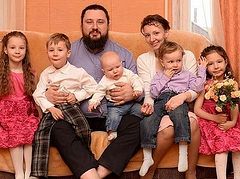Moscow, February 10, 2021
The Russian Orthodox Church has initiated a broad discussion among its clergy and flock to consider updating its stance towards in vitro fertilization reproductive technology, taking into account the development of medical science over the past 20 years.
The draft document, “Ethical Problems Associated with In Vitro Fertilization,” was published on the official site of the Russian Church on Friday and on several other outlets. Comments are being collected by the Inter-Council Presence of the Russian Church until March 29.
The Russian Church formulated its first official position towards IVF in the document, “Bases of the Social Concept of the Russian Orthodox Church,” adopted by the Council of Bishops of the Russian Church in 2000. All kinds of IVF (referred to as extracorporal fertilisation in the document) “involving the production, conservation and purposeful destruction of ‘spare’ embryos” are “morally inadmissible.”
The new draft document notes that since 2000, medical advances have led to the possibility of producing only or two embryos during IVF and transferring them to the womb, thus “the Church also allows for the possibility of IVF for spouses who are of childbearing age.”
At the same time, the document emphasizes that the Church cannot condone the obtaining of “excess” embryos, the cryptopreservation of embryos, fetal reduction, the donation of germ cells, surrogacy, or preimplantation diagnosis.
According to the document, open for discussion, the cryptopreservation of oocytes (immature eggs) for a second attempt at IVF in case of failure of the first is a valid alternative to freezing embryos.
The document states that the decision to use IVF can be left to the discretion of the priest who knows the couple and their ability “to continue to bear the cross of childlessness.”
The document also expresses the Church’s concern that the improvement of reproductive technologies and their widespread introduction may lead to the devaluation of family values and the destruction of family and marriage relations. Thus, the Church recalls the fundamental value of the family and that a child should be born into a married family.
Further, “If therapeutic and surgical methods of treatment do not allow us to avoid infertility, the Church encourages us to perceive childlessness as a special vocation in life,” it reads.
It is also noted that there are various opinions about IVF within the Church, with some clergy and medical professionals being fundamentally opposed to it in any form. “Medical technologies are not able to replace the physical, mental and spiritual unity of a husband and wife, given to them by God in the Sacrament of marriage,” they argue.
Follow us on Facebook, Twitter, Vkontakte, Telegram, WhatsApp, Parler, MeWe, and Gab!





